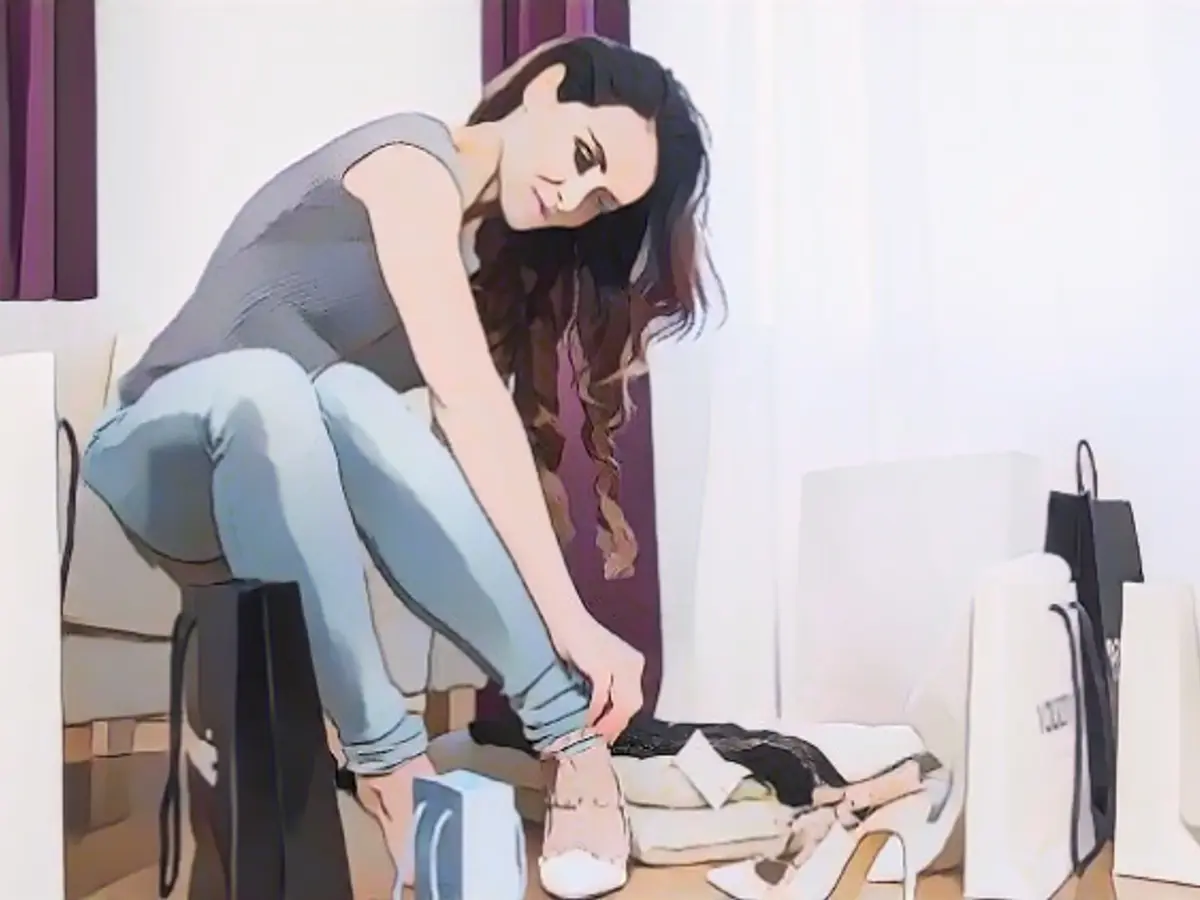Still consumption or already illness?
It's been a tough week, now a shopping spree! But what happens when shopping becomes a habit, fills the cupboards and empties the bank account? Two psychologists explain how shopping addiction develops.
Discover, select, buy: shopping is fun for many people. And sometimes there are days when the haul is a little bigger - three pairs of shoes, a food processor, a coat, two books. Too much? Is this kind of consumer behavior an expression of shopping addiction?
"There's no general answer, it depends on the situation," says Professor Astrid Müller, Head Psychologist at the Clinic for Psychosomatics and Psychotherapy at Hanover Medical School.
Perhaps it was necessary to buy all these things and the money was there. Or defective items had to be replaced with new ones. In such cases, there can be no question of shopping addiction.
Loss of control is a characteristic
"It looks more critical if the frequency of purchases is regularly very high and there is a loss of control when buying," says Nadja Tahmassebi, head psychologist at the Salus Klinik Friedrichsdorf in the Hochtaunus district.
For those affected by shopping addiction, the goods completely lose their appeal as soon as they get home. "Sometimes they don't even unpack them," says Nadja Tahmassebi.
However, the desire to constantly buy new things does not diminish. Even though, firstly, the purchases are not necessary and, secondly, those affected may not be able to afford them. The result is often financial hardship, as Astrid Müller says.
Self-esteem is often an issue for those affected
But what are the causes of such buying behavior? "Inferiority complexes can be behind it, as can self-esteem issues," says Astrid Müller. It is also conceivable that those affected have a strong focus on material values. In other words, they focus heavily on status symbols and define themselves by what they own - and not by who they are as a person.
"People who are affected by shopping addiction often also suffer from depression and anxiety disorders," says Nadja Tahmassebi.
The problem: "For a long time, shopping addiction is ignored and people don't examine their own consumer behavior," says Astrid Müller. Shopping is done to reward or reassure oneself. Those affected cannot regulate their shopping behavior. Only when the negative consequences get out of hand do they realize that something is wrong. For example, when debts pile up.
Ways out of problematic buying behavior
Anyone who discovers signs of problematic purchasing behavior in themselves can impose financial limits on themselves as a first step. "This includes, for example, dividing up exactly how much money you can spend on what," says Nadja Tahmassebi.
Set a specific budget for clothing, one for cosmetics and so on. You should also give yourself the option of overdrawing your account and agree this with the bank. Another strategy is to only pay with cash and return credit cards to the bank.
Another option if there are signs of shopping addiction is this: "Those affected regularly create a purchase log themselves and document exactly what they spend how much money on," says Astrid Müller.
They can also regularly open cupboards at home to remind themselves that they have enough clothes and don't need anything new.
Therapy is about alternatives to shopping
If none of this helps, psychotherapy is an option. This can be behavioral therapy, which involves analyzing one's own behavior in order to identify the triggers for excessive shopping behavior.
If it turns out that buying has the function of a reward, alternatives can be found. "This is often a difficult process," explains Astrid Müller. Because it's about finding something that triggers similar feelings of elation as the purchase.
Perhaps a hot bath can be a reward after a stressful day in the future. But whether this actually works in practice varies from case to case. "Ultimately, it's all about giving up - and that's the hard part," emphasizes Astrid Müller.
Overall, those affected often manage to get their shopping addiction under control thanks to therapeutic help. However, it is uncertain how long this will last. "Relapses can happen again and again," says Nadja Tahmassebi.
When relatives are addicted to shopping
What if you suspect your father or good friend has a shopping addiction? Then you shouldn't be afraid to broach the subject, "in an appreciative and respectful way", as Astrid Müller emphasizes.
In this way, you can encourage the affected relative to visit a counseling center. This could be a specialist addiction support center that offers advice on behavioral addictions. Low-threshold online counseling, such as that offered by the German Caritas Association, can also be helpful.
Read also:
- This will change in December
- Attacks on ships in the Red Sea: shipping companies avoid important trade route
- USA forms military coalition against Houthi attacks on ships in the Red Sea
- German activists speak out in Dubai on suffering in Israel and the Gaza Strip
- In the context of consumer society, private debts can become a major issue for individuals struggling with shopping addiction, as they may accumulate excessive amounts of consumer goods.
- An advisor, such as a psychologist, can be instrumental in helping consumers with shopping addiction understand their behavior and find alternative ways to cope with feelings of distress or low self-esteem.
- As consumer goods pile up in the homes of those afflicted, they may find that the allure of buying new items persists, leading to further financial hardship and disillusionment with the consumer society that often fosters such addictive tendencies.
Source: www.ntv.de







